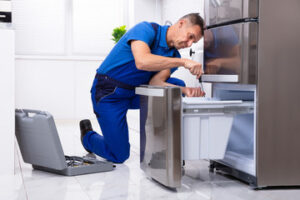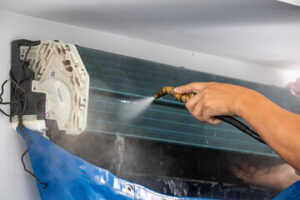Coolers in restaurants, grocery stores, and other businesses get heavy use. These appliances should always be running smoothly to maintain food safety standards and operational efficiency.

When the equipment starts to malfunction, it can lead to large and costly repairs. Luckily, regular maintenance can help prevent these issues from occurring. Contact Commercial Refrigeration Repair Near Me for professional help.
Leak detection is a vital part of commercial refrigeration repair. It mitigates the negative environmental impact of refrigerant leaks, conserves refrigerant, and prolongs equipment life. It also helps in the battle against ozone layer depletion and global warming. Leak detection should be performed semi-annually or annually. A proper detection system will be capable of detecting both PPM and ozone-depleting potential (ODP).
A quick, accurate system will identify any problems with refrigerant levels and warn the facility manager to take action. In many cases, this will include shutting down the refrigeration unit and activating a refrigerant isolation valve. Depending on the size of the leak and its location, this may require a few hours.
The next step is addressing the problem, which can be as simple as a tripped circuit breaker or blown fuse. These issues should be fixed as soon as possible, as they will lead to food spoilage and disrupt operations. Once these issues are addressed, the technician will move on to cleaning coils and inspecting electrical connections. Routine maintenance will help identify minor problems and prevent them from escalating into costly breakdowns.
Another key component of commercial refrigeration repair is leak detection and the use of a refrigerant management system. A comprehensive system will have protocols in place for notifying the right people in case of a leak, and it will be capable of comparing refrigerant usage to a preset threshold. This will allow technicians to quickly assess the situation and determine if it requires immediate attention or can be handled remotely.
Lastly, a good maintenance program will use software tools to track performance trends and detect anomalies. This can make it easier for technicians to identify recurring issues and anticipate future problems, reducing the frequency of commercial refrigerator repairs.
A common sign that a commercial refrigerator needs repair is unusual noises or a change in temperature. These symptoms could indicate a failing thermostat or compressor. A professional technician will be able to diagnose the issue and provide an effective solution. If the repair is simple, it can be completed within a few hours. For more complex issues, the technician will need to test the refrigerator afterward to ensure that everything is functioning properly.
Compressor Repairs
When it comes to commercial refrigeration, the heart of the system is the compressor. This part circulates refrigerant through pipes and coils to absorb and release heat, making it what keeps juice cold in a vending machine or lettuce crisp in a restaurant display case. If the compressor fails, the entire refrigerator could spoil.
A smarter option is to invest in Refrigeration Maintenance Plans that include regular inspections and preventive repairs. These services can keep the compressor running smoothly and save businesses from expensive breakdowns.
While refrigeration systems run hard to keep foods cool, this also puts a strain on the motor and other components. In fact, it’s not uncommon for them to overwork themselves and burn out quickly. A few minor fixes can make a significant difference in the lifespan of the unit and its components.
One of the most common problems that requires refrigeration repairs is food spoilage. This can be due to a range of factors, from door seals that aren’t sealing properly to clogged cooling fans. In addition, refrigerant leaks can also be a culprit. Keeping up with maintenance and making timely repairs reduces the risk of food spoilage while lowering utility bills.
Commercial refrigerator repair services can diagnose problems at the root cause, preventing the spread of food contamination and other issues that lead to costly downtime. Whether it’s a small leak or a complete compressor failure, the team of technicians at Cold Direct will identify the source and fix it quickly and effectively.
Another way to minimize commercial refrigeration repairs is by focusing on energy efficiency. Governmental energy standards often play an important role in equipment purchasing decisions. They encourage businesses to choose machines that use less power, reducing environmental strain and saving money. Staying informed of these requirements during Energy Performance Reviews, and through newsletter subscriptions, can help businesses meet these goals.
Other measures to improve commercial refrigeration efficiency include using insulated doors and lining walk-in units with reflective insulation. Additionally, it’s a good idea to limit the amount of items stored in the fridge to reduce load on the refrigerator’s motor and condenser coils. Stacking items too high can increase airflow resistance and damage the compressor.
Temperature Control Repairs
Erratic temperature control is a major concern for businesses that depend on refrigeration. If the refrigerators aren’t keeping their cold, that can cause perishable products to spoil, which costs money and impacts profits. Effective refrigerator repair services can prevent temperature fluctuations, ensuring that food stays fresh and safe to sell.
Often, commercial fridge repairs involve the thermostat, which needs to be calibrated to ensure accurate readings and keep temperatures within safe ranges. This could be as simple as adjusting the thermostat setting, or it might involve replacing a sensor or fixing a broken one.
Commercial refrigerator repair can also include inspecting the condenser coils and evaporator fan to ensure they’re working properly. Dirty coils and a non-functional fan can block airflow, which reduces cooling efficiency. In addition, the refrigerator may need to be cleaned of dust and debris, which can also hamper functionality.
Another important service that commercial refrigeration professionals offer is cleaning the refrigerator interior. If the interior is dirty, it can create a breeding ground for germs and bacteria. This is especially true of food items that haven’t been refrigerated for a long time, or those that aren’t properly stored. A thorough cleaning can help keep the fridge clean and sanitary, which can improve customer satisfaction and retention.
Other problems can be caused by faulty seals, which can allow cold air to escape and make the refrigerator work harder. This can lead to higher energy costs and shorten the lifespan of the unit. Another common problem is a blocked defrost drain, which can be caused by food particles or debris that build up and prevent the drain from releasing the defrost water.
Regardless of the exact issue, a professional commercial refrigeration repair technician can quickly identify and fix it. They have specialized tools and extensive knowledge of refrigeration systems to provide fast, effective solutions for walk-in coolers and other commercial fridges. They can also recommend routine inspections to help spot potential issues before they become costly and inconvenient. This is a great way to save money and avoid unnecessary downtime in your business.
Electrical Repairs
Commercial refrigerators play an integral role in preserving food and maintaining proper temperature standards. When issues arise, they can cause significant loss in perishable inventory and disrupt business operations. Effective commercial refrigeration repair can prevent these problems and reduce operating costs over time. Regular maintenance includes cleaning coils, checking refrigerant levels and inspecting electrical connections for signs of wear. These preventive measures identify minor concerns before they escalate into expensive breakdowns.
If you notice that your refrigeration system is running louder than usual, the evaporator fan may need to be replaced. It could also be a sign of a problem with the compressor. Similarly, a clicking sound could indicate that the ice maker isn’t working properly. Whether it’s a minor issue or a larger one, commercial refrigeration repair experts have the tools and knowledge to get your refrigerator up and running again as quickly as possible.
Faulty sensors, thermostats and other electrical components can lead to a sudden energy spike or a fridge that fails to cool correctly. These issues can be costly and potentially dangerous for food safety. A commercial refrigeration repair professional can pinpoint the source of these issues and recommend solutions.
In addition to repairing complex parts like compressors and evaporators, commercial refrigeration repair services offer system upgrades that improve performance or energy efficiency. This helps businesses comply with food safety regulations and cut operational costs over time.
Commercial refrigeration repair professionals have a range of tools and software at their disposal to simplify the process and ensure the job is done right. Using these tools enables technicians to diagnose and fix even the most complicated issues quickly and efficiently. In addition, these tools help technicians spot potential issues before they become major problems. They can also provide detailed reports on how the refrigerator was maintained and what repairs were performed. This information can be a helpful reference when planning future maintenance work for the equipment. It also helps businesses budget for necessary repairs in advance. By catching issues early, businesses can avoid inventory loss, electricity use spikes and food spoilage.
